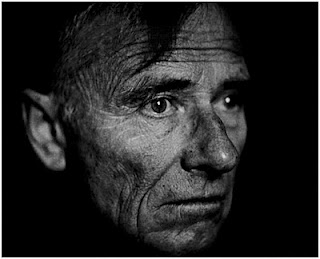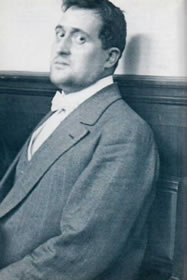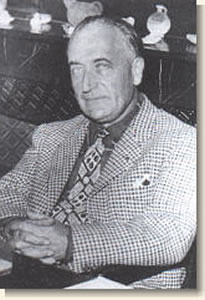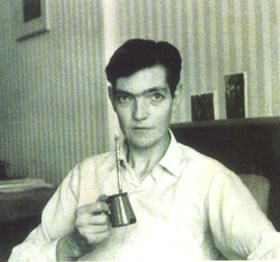De Brits-Amerikaanse schrijver Christopher Isherwood werd geboren op 26 augustus 1904 in Disley in het graafschap Cheshire in Engeland. Zie ook mijn blog van 26 augustus 2010 en eveneens alle tags voor Christopher Isherwood op dit blog.
Uit: Goodbye to Berlin
„To-morrow I am going to England. In a few weeks I shall return, but only to pick up my things, before leaving Berlin altogether.
Poor Frl. Schroeder is inconsolable: “I shall never find another gentleman like you, Herr Issyvoo—always so punctual with the rent…. I’m sure I don’t know what makes you want to leave Berlin, all of a sudden, like this….”
It’s no use trying to explain to her, or talking politics. Already she is adapting herself, as she will adapt herself to every new régime. This morning I even heard her talking reverently about “Der Führer” to the porter’s wife. If anybody were to remind her that, at the elections last November, she voted communist, she would probably deny it hotly, and in perfect good faith. She is merely acclimatizing herself, in accordance with a natural law, like an animal which changes its coat for the winter. Thousands of people like Frl. Schroeder are acclimatizing themselves. After all, whatever government is in power, they are doomed to live in this town.
* * *
To-day the sun is brilliantly shining; it is quite mild and warm. I go out for my last morning walk, without an overcoat or hat. The sun shines, and Hitler is master of this city. The sun shines, and dozens of my friends—my pupils at the Workers’ School, the men and women I met at the I.A.H. [Internationale Arbeiter-Hilfe]—are in prison, possibly dead. But it isn’t of them that I am thinking—the clear-headed ones, the purposeful, the heroic; they recognized and accepted the risks. I am thinking of poor Rudi, in his absurd Russian blouse. Rudi’s make-believe, story-book game has become earnest; the Nazis will play it with him. The Nazis won’t laugh at him; they’ll take him on trust for what he pretended to be. Perhaps at this very moment Rudi is being tortured to death.
I catch sight of my face in the mirror of a shop, and am horrified to see that I am smiling. You can’t help smiling, in such beautiful weather. The trams are going up and down the Kleiststrasse, just as usual. They, and the people on the pavement, and the teacosy dome of the Nollendorfplatz station have an air of curious familiarity, of striking resemblance to something one remembers as normal and pleasant in the past—like a very good photograph.
No. Even now I can’t altogether believe that any of this has really happened…. „

Christopher Isherwood (26 augustus 1904 – 4 januari 1986)
De Franstalige schrijver en dichter Guillaume Apollinaire werd in Parijs geboren op 26 augustus 1880. Zie ook mijn blog van 26 augustus 2010 en eveneens alle tags voor Guillaume Apollinaire op dit blog.
Le pont Mirabeau
Sous le pont Mirabeau coule la Seine
Et nos amours
Faut-il qu’il m’en souvienne
La joie venait toujours après la peine
Vienne la nuit sonne l’heure
Les jours s’en vont je demeure
Les mains dans les mains restons face à face
Tandis que sous
Le pont de nos bras passe
Des éternels regards l’onde si lasse
Vienne la nuit sonne l’heure
Les jours s’en vont je demeure
L’amour s’en va comme cette eau courante
L’amour s’en va
Comme la vie est lente
Et comme l’Espérance est violante
Vienne la nuit sonne l’heure
Les jours s’en vont je demeure
Passent les jours et passent les semaines
Ni temps passés
Ni les amours reviennent
Sous le pont Mirabeau coule la Seine
Vienne la nuit sonne l’heure
Les jours s’en vont je demeure.

Guillaume Apollinaire (26 augustus 1880 – 9 november 1918)
De Franse schrijver Jules Romains, pseudoniem van Louis Henri Farigoule, werd geboren op 26 augustus 1885 in La Chapuze in het kanton Saint-Julien-Chapteuil. Zie ook mijn blog van 26 augustus 2010 en eveneens alle tags voor Jules Romain op dit blog.
Uit: KNOCK
“Un silence .
KNOCK , la fait asseoir. : Vous vous rendez compte de votre état?
LA DAME : Non.
KNOCK , il s’assied en face d’elle . : Tant mieux. Vous avez envie de guérir, ou vous n’avez pas envie?
LA DAME : J’ai envie.
KNOCK : J’aime mieux vous prévenir tout de suite que ce sera très long et très coûteux.
LA DAME : Ah! Mon Dieu! Et pourquoi ça?
KNOCK : Parce qu’on ne guérit pas en cinq minutes un mal qu’on traîne depuis quarante ans.
LA DAME : Depuis quarante ans?
KNOCK : Oui, depuis que vous êtes tombée de votre échelle.
LA DAME : Et combien que ça me coûterait?
KNOCK : Qu’est-ce que valent les veaux, actuellement?
LA DAME : Ca dépend des marchés et de la grosseur. Mais on ne peut guère en avoir de propres à moins de quatre ou cinq cents francs.
KNOCK : Et les cochons gras?
LA DAME : Il y en a qui font plus de mille.
KNOCK : Eh bien! ça vous coûtera à peu près deux cochons et deux veaux.
LA DAME : Ah! Là! Là! Près de trois mille francs? C’est une désolation, Jésus Marie!
KNOCK : Si vous aimez mieux faire un pèlerinage, je ne vous en empêche pas.
LA DAME : Oh! un pèlerinage, ça revient cher aussi et ça ne réussit pas souvent. (Un silence.) Mais qu’est-ce que je peux donc avoir de si terrible que ça?
KNOCK , avec une grande courtoisie . : Je vais vous l’expliquer en une minute au tableau noir. (Il va au tableau et commence un croquis.) Voici votre moelle épinière, en coupe, très schématiquement, n’est-ce pas? Vous reconnaissez ici votre faisceau de Turck et ici votre colonne de Clarke. Vous me suivez ? Eh bien! Quand vous êtes tombée de l’échelle, votre Turck et votre Clarke ont glissé en sens inverse (il trace des flèches de direction) de quelques dixièmes de millimètre. Vous me direz que c’est très peu. Évidemment. Mais c’est très mal placé. Et puis vous avez ici un tiraillement continu qui s’exerce sur les multipolaires.
Il s’essuie les doigts.
LA DAME : Mon Dieu! Mon Dieu!
KNOCK : Remarquez que vous ne mourrez pas du jour au lendemain. Vous pouvez attendre.
LA DAME : Oh! Là! là! J’ai bien eu du malheur de tomber de cette échelle!
KNOCK : Je me demande même s’il ne vaut pas mieux laisser les choses comme elles sont. L’argent est si dur à gagner. Tandis que les années de vieillesse, on en a toujours bien assez. Pour le plaisir qu’elles donnent!”

Jules Romains (26 augustus 1885 – 14 augustus 1972)
De Argentijnse schrijver Julio Cortázar werd geboren op 26 augustus 1914 in Brussel. Zie ook mijn blog van 26 augustus 2010 en eveneens alle tags voor Julio Cortázar op dit blog.
Uit: Hopscotch
“…all of this from a kind of music that horrifies solid citizens who think that nothing is true unless there are programs and ushers, and that’s the way things are and jazz ie like a bird who migrates or emigrates or immigrates or transmigrates, roadblock jumper, smuggler, something that runs and mixes in and tonight in Vienna Ella Fitzgerald is singing while in Paris Kenny Clarke is helping open a new cave and in Perpignan Oscar Peterson’s fingers are dancing around and Satchmo, everywhere, with that gift of omnipresence given him by the Lord, in Birmingham, in Warsaw, in Milan, in Buenos Aires, in Geneva, in the whole world, is inevitable, is rain and bread and salt, something completely beyond national ritual, sacred traditions, language and folklore: a cloud without frontiers, a spy of air and water, an archetypal form, something from before, from below, that brings Mexicans together with Norwegians and Russians and Spaniards, brings them back into obscure and forgotten central flame, clumsily and badly and precariously he delivers them back to a betrayed origin, he shows them that perhaps there have been other paths and that the only one they took was maybe not the only one or the best one, or perhaps that there have been other paths that made for softer walking and that they had not taken those, or that they only took them in a halfway sort of way, and that a man is always more than a man and always less than a man, more than a man because he has in himself all that jazz suggests and lies in wait for and even anticipates, and less than a man because he has made an aesthetic and sterile game out of this liberty, a chessboard where one must be bishop or knight, a definition of liberty which is taught in school, in the very schools where the pupils are never taught ragtime rhythm or the first notes of the blues, and so forth and so on.”

Julio Cortázar (26 augustus 1914 – 12 februari 1984)
Zie voor nog meer schrijvers van de 26e augustus ook mijn blog van 26 augustus 2011 deel 1 en eveneens deel 2.
